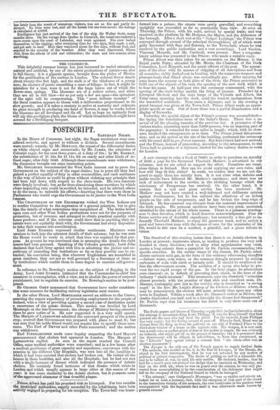POSTSCRIPT.
SATURDAY NIGHT.
In the House of Commons, last night, the Sugar resolutions were con- sidered seriatim, and agreed to without a division. Several amendments were moved: namely, by Mr. MOFFATT, the repeal of the differential duties on white clayed sugar and muscovado; by Mr. JAMBS, the admission of Colonial sugar, for the next three years, at a duty of 103.- ' by Mr. BARELY, the substitution of 11. 10s. for 11. 113. 6d. on candy and other kinds of re- fined sugar, after July 1848. Although these amendments were withdrawn, the discussion brought out some interesting points.
Mr. GOULBURN recommended the West India interest not to press the Government on the subject of the sugar-duties • but to press till they had gained a perfect equality of duty in other commodities, and such assistance in the way of labour as could be given without violating any principle that had been laid down with respect to the' slave-trade. His own interests were'deeply involved; but, so far from abandoning those exertions by which clone impending ruin could be avoided, he intended, and he advised others to do the same, to redouble his eft-tar—kw:wing that there were those in Parliament who would urge the Government to do justice to the West India interest.
The CHANCELLOR OF THE EXCHEQUER wished the West Indians not to confine themselves to the expression of a general principle, but to give him the details of what restrictions they complained of The duties levied neon ram and other West Indian productions were not for the purposes of protection, but of revenue, and arranged to obtain practical equality with home produce; and if the colonists could show that in anything their in- terests were not equitably dealt with, the Government had every disposition to take their reasons into consideration.
Lord Joni RUSSELL expressed similar sentiments. Ministers were anxious to look into the minutest details of their scheme; but he was sure the House would be ready to admit that time was required for that pur- pose. At present he was convinced that in arranging the details the right course had been pursued. Speaking of the Colonies generally, Lord John declared that Lord Grey agreed with him in admitting the justice and ex- pediency of extending free institutions as far as they possibly can be ex- tended; his conviction being, that wherever Englishmen are assembled in great numbers, they are not so well governed by a Secretary of State as by institutions which enable them in some degree to exercise self-govern- ment.
In reference to Dr. Bowring's motion on the subject of flogging in the Army, Lord Joan Resents. intimated that the Commander-in-chief has measures in contemplation, with a view, not to abolish the power of corporal punishment, but to regulate its exercise. Dr. Itowrines motion to be post- poned.
Sir GEORGE GREY announced that Government have under considera- tion some measure for facilitating railway legislation next session.
In the other House, Lord MONTEAGLE moved an address to the Crown, asserting the urgent expediency of promoting employment for the people of Ireland, with a view of providing against a second year of destitution under a recurrence of the potato disease. This motion was levelled by Lord Monteagle at the late Government; the change of Ministry having odcurred since he gave notice of it. He now supported it in a very mild speech. The Marquis of LANSDOWNE admitted the untoward prospect of the potato crop; averred that Government was prepared with plans to meet it; but was sure that his noble friend would not require him to specify those mea- sures. The Earl of DEVON and other Peers concurred; and the motion was withdrawn.
Earl EITZHARDINGE made some inquiry respecting the Lord Mayor's announcement that cholera had appeared in London. The Marquis of Laftenowxn replied. As soon as the report reached the Council Office, some medical authorities were consulted; and in a few hours after a medical gentleman of great capacity and experience, conversant with the practice in the different City Hospitals, was sent into all the localities in which it had been asserted that cholera had broken out. He visited all the houses in those localities, and also all the Hospitals; but he had not met with a single instance of disease which indicated the presence of Asiatic cholera. He certainly found instances of that disease which exists in London and which usually appears in large cities at this season of the year: it has some similarity to the Asiatic cholera, but it possesses none of the aggravated character of that dreadful-plague.


























 Previous page
Previous page